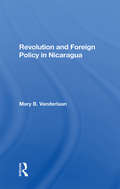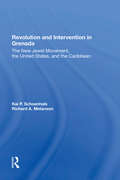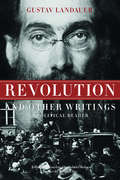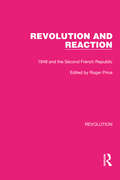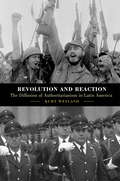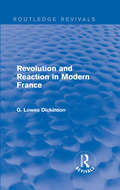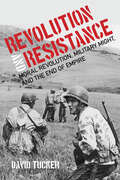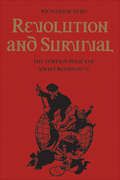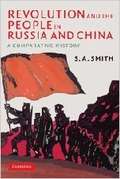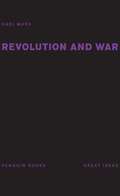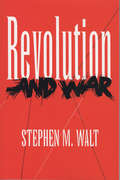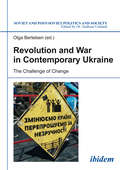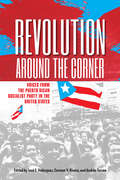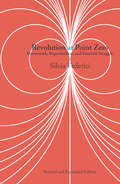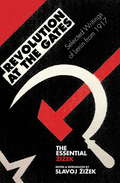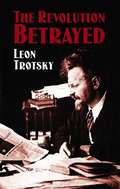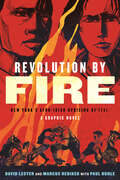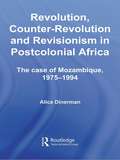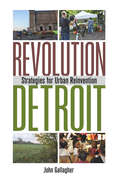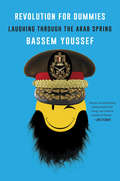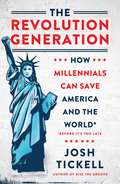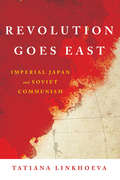- Table View
- List View
Revolution And Foreign Policy In Nicaragua
by Mary VanderlaanSince the revolution in 1979, Nicaragua has faced economic dislocation, a growing debt, chronic hard currency shortages, a counter-revolutionary war, economic and diplomatic pressure from the US, and regional isolation. In spite of these challenging problems, the Sandinista leadership, maintaining a broad array of international contacts, continues
Revolution And Intervention In Grenada: The New Jewel Movement, The United States, And The Caribbean
by Kai Schoenhals Richard MelansonIn Part 1 of this book, Dr. Schoenhals places the Grenadian Revolution and its aftermath in historical perspective. He explores the Anglo-French rivalry over the island, the period of slavery, and the British colonial administration and gives particular emphasis to the Gairy decades (1951-1979). His discussion of the People's Revolutionary Government is based on extensive Interviews with the leadership of the New Jewel Movement, foreign diplomats, and Grenadian citizens, and on a review of documents captured by the United States during occupation of the island. In Part 2, Dr. Melanson, after briefly reviewing the nature of U.S. interests In the region and U.S.-Caribbean relations during the Nixon years, focuses on the Carter and Reagan administrations' policies in the Caribbean and relations with the Grenadian government. He examines the justification offered by President Reagan for the 1983 intervention, domestic responses to the action in the United States, and its implications for Reagan's Central American policies. Finally, he considers whether the action will prove to be a prelude to a new domestic consensus about the use of U.S. military power in the Third World.
Revolution and Other Writings: A Political Reader
by Gustav Landauer Gabriel Kuhn Richard DayThe first comprehensive collection of Gustav Landauer's writings in English, this valuable addition to the history of anarchism in the early 20th century gathers more than 40 influential works by one of Germany's most prominent radical agitators. The readings presented here cover Landauer's entire political biography, from his early anarchism of the 1890s and his philosophical reflections at the turn of the century to the subsequent establishment of the Socialist Bund and his tireless agitation against the coming Great War. Additional chapters on war and nationalism, the United States and Mexico, and opinion pieces and personal letters reveal the further scope of Landauer's thinking with pieces on corporate capital, education, language, and Judaism.
Revolution and Reaction: 1848 and the Second French Republic (Routledge Library Editions: Revolution #25)
by Roger PriceThis book, first published in 1975, examines the events of the French Second Republic, the themes of protest and repression in particular. It analyses how popular discontent is mobilised and becomes political protest and revolution, and how the machinery of government operates in a crisis situation.
Revolution and Reaction: The Diffusion of Authoritarianism in Latin America
by Kurt WeylandWhy did so many Latin American leftists believe they could replicate the Cuban Revolution in their own countries, and why did so many rightists fear the spread of Communism? Cognitive-psychological insights about people's distorted inferences and skewed interest calculations explain why the left held exaggerated hopes and why the right experienced excessive dread. The resulting polarization provoked a powerful backlash in which the right uniformly defeated the left. To forestall the feared spread of revolution, the military in many countries imposed authoritarian regimes and brutally suppressed left-wingers. Overly worried about the advance of Cuban-inspired radicalism as well, the United States condoned and supported the installation of dictatorship, but Latin American elites took the main initiative in these regressive regime changes. With a large number of primary and secondary sources, this book documents how the misperceptions on both sides of the ideological divide thus played a crucial role in the frequent destruction of democracy.
Revolution and Reaction in Modern France (Routledge Revivals: Collected Works of G. Lowes Dickinson)
by G. Lowes DickinsonFirst published in 1892, this book describes the development of political thought and political parties in ‘modern’ France. It starts by discussing the French Revolution of 1789 and closes with the Paris Commune of 1871. The book is not written strictly in chronological order but rather focuses on explaining the general character of each successive period. It will be of interest to both the student, and the more general reader.
Revolution and Rebellion in the Early Modern World: Population Change and State Breakdown in England, France, Turkey, and China,1600-1850; 25th Anniversary Edition
by Jack A. GoldstoneWhat can the great crises of the past teach us about contemporary revolutions? Jack Goldstone shows the important role of population changes, youth bulges, urbanization, elite divisions, and fiscal crises in creating major political crises. Goldstone shows how state breakdowns in both western monarchies and Asian empires followed the same patterns, triggered when inflexible political, economic, and social institutions were overwhelmed by cumulative changes in population structure that collided with popular aspirations and state-elite relations. Examining the great revolutions of Europe—the English and French Revolutions—and the great rebellions of Asia, which shattered dynasties in Ottoman Turkey, China, and Japan, he shows how long cycles of revolutionary crises and stability similarly shaped politics in Europe and Asia, but led to different outcomes. In this 25th anniversary edition, Goldstone reflects on the history of revolutions in the last twenty-five years, from the Philippines and other color revolutions to the Arab Uprisings and the rise of the Islamic State. In a new introduction, he re-examines his pioneering look at the role of population changes—such as rising youth cohorts, urbanization, shifting elite mobility––as continuing causal factors of revolutions and rebellions. The new concluding chapter updates his major theory and looks to the future of revolutions in the Middle East, Asia, and Africa.
Revolution and Resistance: Moral Revolution, Military Might, and the End of Empire
by David TuckerWestern imperialism has always been shadowed by terrorism and insurgency.In this provocative history, David Tucker argues that "irregular warfare"—including terrorism, guerrilla warfare, and other insurgency tactics—is intimately linked to the rise and decline of Euro-American empire around the globe. Tracing the evolution of resistance warfare from the age of the conquistadors through the United States’ recent ventures in Afghanistan and Iraq, Revolution and Resistance demonstrates that contemporary conflicts in the Middle East, Africa, and Asia are simply the final stages in the unraveling of Euro-American imperialism. Tucker explores why it was so difficult for indigenous people and states to resist imperial power, which possessed superior military technology and was driven by a curious moral imperative to conquer. He also explains how native populations eventually learned to fight back by successfully combining guerrilla warfare with political warfare. By exploiting certain Euro-American weaknesses—above all, the instability created by the fading rationale for empire—insurgents were able to subvert imperialism by using its own ideologies against it. Tucker also examines how the development of free trade and world finance began to undermine the need for direct political control of foreign territory.Touching on Pontiac’s Rebellion of 1763, Abd el-Kader’s jihad in nineteenth-century Algeria, the national liberation movements that arose in twentieth-century Palestine, Vietnam, and Ireland, and contemporary terrorist activity, Revolution and Resistance shows how changing means have been used to wage the same struggle. Emphasizing moral rather than economic or technological explanations for the rise and fall of Euro-American imperialism, this concise, comprehensive book is required reading for anyone seeking to understand the character of contemporary conflict.
Revolution and Resistance: Moral Revolution, Military Might, and the End of Empire
by David TuckerThis exploration of the links between imperialism and insurgency is “a reliable introduction to a complex subject” (Dennis E. Showalter, coauthor of If the Allies Had Fallen).In this provocative history, David Tucker argues that “irregular warfare”—including terrorism, guerrilla warfare, and other insurgency tactics—is intimately linked to the rise and decline of Euro-American empire around the globe. Tracing the evolution of resistance warfare from the age of the conquistadors through the United States’ recent ventures in Afghanistan and Iraq, Revolution and Resistance demonstrates that contemporary conflicts in the Middle East, Africa, and Asia are simply the final stages in the unraveling of Euro-American imperialism.Tucker explores why it was so difficult for indigenous people and states to resist imperial power, which possessed superior military technology and was driven by a curious moral imperative to conquer. He also explains how native populations eventually learned to fight back by successfully combining guerrilla warfare with political warfare. By exploiting certain Euro-American weaknesses—above all, the instability created by the fading rationale for empire—insurgents were able to subvert imperialism by using its own ideologies against it. Tucker also examines how the development of free trade and world finance began to undermine the need for direct political control of foreign territory.Touching on Pontiac’s Rebellion of 1763, Abd el-Kader’s jihad in nineteenth-century Algeria, the national liberation movements in twentieth-century Palestine, Vietnam, and Ireland, and contemporary terrorist activity, this book shows how changing means have been used to wage the same struggle. Emphasizing moral rather than economic or technological explanations for the rise and fall of Euro-American imperialism, this concise, comprehensive book is required reading for anyone seeking to understand the character of contemporary conflict.
Revolution and Survival: The Foreign Policy of Soviet Russia 1917-18
by Richard DeboThis is a highly readable and absorbing account of Bolshevik foreign policy during Lenin's first year in power. In tracing the development of that policy, the book considers both the impact it had on a world torn by war and the effect it had on the Bolsheviks themselves, now no longer engaged in clandestine struggle but in effective state control. The book explores Lenin's relationship with the various elements of the party – his fruitful, but frequently discordant, relationship with Trotsky in particular – and the way he sought and obtained support for his policies in the tumultuous political circumstances of 1917 and 1918. It studies Lenin's political style as well, in an attempt to explain the shift from his utopianism of 1917 to his hard-headed political realism of 1918. The analysis focuses on the fundamental questions of how the Soviet state, lacking significant military forces in the midst of a world war, succeeded in surviving the first year of the revolution, and how it survived the new threat of the changed political situation at the end of the war. Revolution and Survival is the first history of Lenin's foreign policy during this crucial period, and Richard Debo has fused insight with style in a fascinating and authoritative book.
Revolution and the People in Russia and China
by S. A. SmithA unique comparative account of the roots of Communist revolution in Russia and China. Steve Smith examines the changing social identities of peasants who settled in St Petersburg from the 1880s to 1917 and in Shanghai from the 1900s to the 1940s. Russia and China, though very different societies, were both dynastic empires with backward agrarian economies that suddenly experienced the impact of capitalist modernity. This book argues that far more happened to these migrants than simply being transformed from peasants into workers. It explores the migrants' identification with their native homes; how they acquired new understandings of themselves as individuals and new gender and national identities. It asks how these identity transformations fed into the wider political, social and cultural processes that culminated in the revolutionary crises in Russia and China, and how the Communist regimes that emerged viewed these transformations in the working classes they claimed to represent.
Revolution And Transition In East-central Europe: Second Edition (Dilemmas in World Politics )
by David MasonEastern and Western Europe continue to change in their relationship to one another and in their ongoing dynamic with the post-Soviet states. Economic development, electoral upheaval, and the Bosnian crisis all color the transition from communism to democracy and from a Cold War outlook to a new global order still taking shape.In this fully revised and updated edition of his popular and critically acclaimed text, David Mason brings the revolutionary events of 1989 into context with the transitional yet turbulent 1990s. We see new parties, new politics, new constitutions, and new opportunities in light of economic shock therapies, ?left turns? in recent elections, and dissolving sovereignties and alliances. Despite savage ethnic conflict, economic scarcity, and political insecurity, Mason shows us that East-Central Europe is consolidating and reemerging as a region to be reckoned with on the global stage.
Revolution and War
by Karl MarxWritten during Karl Marx's brilliant career as a polemical journalist, these blazing pieces tackle subjects ranging from the strikes of angry British workers to insurrection in Europe, from the American Civil War to the misery of colonial rule in India, demonstrating the radical spirit and outrage at social injustice that would make him one of the most influential political philosophers of all time.Throughout history, some books have changed the world. They have transformed the way we see ourselves - and each other. They have inspired debate, dissent, war and revolution. They have enlightened, outraged, provoked and comforted. They have enriched lives - and destroyed them. Now Penguin brings you the works of the great thinkers, pioneers, radicals and visionaries whose ideas shook civilization and helped make us who we are.
Revolution and War
by Stephen M. WaltRevolution within a state almost invariably leads to intense security competition between states, and often to war. In Revolution and War, Stephen M. Walt explains why this is so, and suggests how the risk of conflicts brought on by domestic upheaval might be reduced in the future. In doing so, he explores one of the basic questions of international relations: What are the connections between domestic politics and foreign policy?Walt begins by exposing the flaws in existing theories about the relationship between revolution and war. Drawing on the theoretical literature about revolution and the realist perspective on international politics, he argues that revolutions cause wars by altering the balance of threats between a revolutionary state and its rivals. Each state sees the other as both a looming danger and a vulnerable adversary, making war seem both necessary and attractive. Walt traces the dynamics of this argument through detailed studies of the French, Russian, and Iranian revolutions, and through briefer treatment of the American, Mexican, Turkish, and Chinese cases. He also considers the experience of the Soviet Union, whose revolutionary transformation led to conflict within the former Soviet empire but not with the outside world. An important refinement of realist approaches to international politics, this book unites the study of revolution with scholarship on the causes of war.
Revolution and War in Contemporary Ukraine: The Challenge of Change (Soviet and Post-Soviet Politics and Society #161)
by Olga BertelsenWhat are the reasons behind, and trajectories of, the rapid cultural changes in Ukraine since 2013? This volume highlights: the role of the Revolution of Dignity and the Russian-Ukrainian war in the formation of Ukrainian civil society; the forms of warfare waged by Moscow against Kyiv, including information and religious wars; Ukrainian and Russian identities and cultural realignment; sources of destabilization in Ukraine and beyond; memory politics and Russian foreign policies; the Kremlin's geopolitical goals in its 'near abroad'; and factors determining Ukraine's future and survival in a state of war. The studies included in this collection illuminate the growing gap between the political and social systems of Ukraine and Russia. The anthology illustrates how the Ukrainian revolution of 2013–2014, Russia's annexation of the Crimean peninsula, and its invasion of eastern Ukraine have altered the post-Cold War political landscape and, with it, regional and global power and security dynamics.
Revolution Around the Corner: Voices from the Puerto Rican Socialist Party in the U.S.
by José E. Velázquez, Carmen V. Rivera, and Andrés TorresActive from the late 1960s until the mid-1990s, the U.S. branch of the Puerto Rican Socialist Party (PSP) worked simultaneously to build support for Puerto Rican independence and to engage in radical social change within the United States. Revolution Around the Corner chronicles this unique social movement, describing various mass campaigns and the inner workings of the organization. The editors and contributors—all former members, leaders, and supporters of the PSP—offer a range of views and interpretations of their experience. Combining historical accounts, personal stories, interviews, and retrospective analysis, Revolution Around the Corner examines specific actions such as the National Day of Solidarity (El Acto Nacional), the Bicentennial without Colonies, the Save Hostos struggle, and the Vieques campaign. Testimonies recount the pros and cons of membership diversity, as well as issues of loyalty and compañerismo. In addition, essays describe the PSP’s participation in coalitions and alliances with Left and progressive movements. The book concludes with the editors’ reflections on the PSP’s achievements, mistakes, and contributions.
Revolution at Point Zero: Housework, Reproduction, and Feminist Struggle (Common Notions Ser.)
by Silvia FedericiAs Federici reveals, behind the capitalist organization of work and the contradictions inherent in "alienated labor" is an explosive ground zero for revolutionary practice upon which are decided the daily realities of our collective reproduction. Beginning with Federici's organizational work in the Wages for Housework movement, the essays collected here unravel the power and politics of wide but related issues including the international restructuring of reproductive work and its effects on the sexual division of labor, the globalization of care work and sex work, the crisis of elder care, the development of affective labor, and the politics of the commons. This new and expanded edition contains two previously unpublished essays by the author.
Revolution at the Gates
by V. I. Lenin Slavoj ZizekThe idea of a Lenin renaissance might well provoke an outburst of sarcastic laughter. Marx is OK, but Lenin? Doesn't he stand for the big catastrophe which left its mark on the entire twentieth-century?Lenin, however, deserves wider consideration than this, and his writings of 1917 are testament to a formidable political figure. They reveal his ability to grasp the significance of an extraordinary moment in history. Everything is here, from Lenin-the-ingenious-revolutionary-strategist to Lenin-of-the-enacted-utopia. To use Kierkegaard's phrase, what we can glimpse in these writings is Lenin-in-becoming: not yet Lenin-the-Soviet-institution, but Lenin thrown into an open, contingent situation.In Revolution at the Gates, Slavoj i ek locates the 1917 writings in their historical context, while his afterword tackles the key question of whether Lenin can be reinvented in our era of "cultural capitalism." i ek is convinced that, whatever the discussion--the forthcoming crisis of capitalism, the possibility of a redemptive violence, the falsity of liberal tolerance--Lenin's time has come again.
The Revolution Betrayed
by Leon Trotsky Max EastmanOne of Marxism's most important texts, The Revolution Betrayed explores the fate of the Russian Revolution after Lenin's death. Written in 1936 and published the following year, this brilliant and profound evaluation of Stalinism from the Marxist standpoint prophesied the collapse of the Soviet Union and subsequent related events.The effects of the October Revolution led to the establishment of a nationalized planned economy, demonstrating the practicality of socialism for the first time. By the 1930s, however, the Soviet workers' democracy had crumbled into a state of bureaucratic decay that ultimately gave rise to an infamous totalitarian regime. Trotsky employs facts, figures, and statistics to show how Stalinist policies rejected the enormous productive potential of the nationalized planned economy in favor of a wasteful and corrupt bureaucratic system.Six decades after the publication of this classic, the shattering of Stalinist regimes in Russia and Eastern Europe has confused and demoralized countless political activists. The Revolution Betrayed offers readers of every political persuasion an insider's view of what went wrong.
Revolution by Fire: New York's Afro-Irish Uprising of 1741, a Graphic Novel
by David Lester Marcus RedikerBased on the little known real life "Slave Insurrection" of 1741, this book imagines outlaw fugitive John Gwin and an eclectic crew of renegades as they attempt to disrupt and overthrow the colonial social orderRebel fugitive John Gwin was previously introduced in Under the Banner of King Death and this graphic novel continues his adventures. Revolution by Fire is a hypothetical look at the inner workings of the so called &“New York Conspiracy&” or "Slave Rebellion" of 1741, following the figures who were considered the real-life masterminds of the plot.Featuring an eclectic crew of African-American, Irish, and mixed race Hispanic sailors, soldiers, and renegades, Gwin and his band are determined to capture New York City in their own names and fight the higher class &“wigs and ruffles&” wearing white people. Unfortunately for the conspirators, suspicions about an uprising were already in the minds of the Governor and his fellow elites, and the events that followed change the course of everyone&’s lives forever.Based on the chapter titled &“Outcasts of the Nations of the Earth&” in Rediker&’s and Peter Linebaugh&’s The Many-Headed Hydra: Sailors, Slaves, Commoners, and the Hidden History of the Revolutionary Atlantic, the book provides a fly-on-the-wall view of a historical event reimagined, highlighting cooperation among races and classes that transcends the social order of its time—and inspire us today.
Revolution, Counter-Revolution and Revisionism in Postcolonial Africa: The Case of Mozambique, 1975-1994 (Routledge Studies in Modern History #Vol. 3)
by Alice DinermanThis groundbreaking study investigates defining themes in the field of social memory studies as they bear on the politics of post-Cold-War, post-apartheid Southern Africa. Alice Dinerman offers a detailed chronicle of the Mozambican government’s attempts to revise the country's troubled postcolonial past with a view to negotiating the political challenges posed by the present. In doing so, she lays bare the path-dependence of memory practices, while tracing their divergent trajectories, shifting meanings and varied combinations within ruling discourse and performance. Central themes include: the interplay between past and present the dialectic between remembering and forgetting the dynamics between popular and official memory discourses the politics of acknowledgement. Dinerman’s original analysis is essential reading for students of modern Africa, the sociology of memory, Third World politics and post-conflict societies.
Revolution Detroit: Strategies for Urban Reinvention
by John GallagherAfter decades of suburban sprawl, job loss, and lack of regional government, Detroit has become a symbol of post-industrial distress and also one of the most complex urban environments in the world. In Revolution Detroit: Strategies for Urban Reinvention, John Gallagher argues that Detroit's experience can offer valuable lessons to other cities that are, or will soon be, dealing with the same broken municipal model. A follow-up to his award-winning 2010 work, Reimagining Detroit, this volume looks at Detroit's successes and failures in confronting its considerable challenges. It also looks at other ideas for reinvention drawn from the recent history of other cities, including Cleveland, Flint, Richmond, Philadelphia, and Youngstown, as well as overseas cities, including Manchester and Leipzig. This book surveys four key areas: governance, education and crime, economic models, and the repurposing of vacant urban land. Among the topics Gallagher covers are effective new urban governance models developed in Cleveland and Detroit; new education models highlighting low-income-but-high-achievement schools and districts; creative new entrepreneurial business models emerging in Detroit and other post-industrial cities; and examples of successful repurposing of vacant urban land through urban agriculture, restoration of natural landscapes, and the use of art in public places. He concludes with a cautious yet hopeful message that Detroit may prove to be the world's most important venue for successful urban experimentation and that the reinvention portrayed in the book can be repeated in many cities. Gallagher's extensive traveling and research, along with his long career covering urban redevelopment for the Detroit Free Press, has given him an unmatched perspective on Detroit's story. Readers interested in urban studies and recent Detroit history will appreciate this thoughtful assessment of the best practices and obvious errors when it comes to reinventing our cities.
Revolution for Dummies: Laughing through the Arab Spring
by Bassem Youssef“Hilarious and Heartbreaking. Comedy shouldn’t take courage, but it made an exception for Bassem.” --Jon Stewart"The Jon Stewart of the Arabic World"—the creator of The Program, the most popular television show in Egypt’s history—chronicles his transformation from heart surgeon to political satirist, and offers crucial insight into the Arab Spring, the Egyptian Revolution, and the turmoil roiling the modern Middle East, all of which inspired the documentary about his life, Tickling Giants.Bassem Youssef’s incendiary satirical news program, Al-Bernameg (The Program), chronicled the events of the 2011 Egyptian Revolution, the fall of President Hosni Mubarak, and the rise of Mubarak’s successor, Mohamed Morsi. Youssef not only captured his nation’s dissent but stamped it with his own brand of humorous political criticism, in which the Egyptian government became the prime laughing stock.So potent were Youssef’s skits, jokes, and commentary, the authoritarian government accused him of insulting the Egyptian presidency and Islam. After a six-hour long police interrogation, Youssef was released. While his case was eventually dismissed, his television show was terminated, and Youssef, fearful for his safety, fled his homeland. In Revolution for Dummies, Youssef recounts his life and offers hysterical riffs on the hypocrisy, instability, and corruption that has long animated Egyptian politics. From the attempted cover-up of the violent clashes in Tahrir Square to the government’s announcement that it had created the world’s first "AIDS cure" machine, to the conviction of officials that Youssef was a CIA operative—recruited by Jon Stewart—to bring down the country through sarcasm. There’s much more—and it’s all insanely true.Interweaving the dramatic and inspiring stories of the development of his popular television show and his rise as the most contentious funny-man in Egypt, Youssef’s humorous, fast-paced takes on dictatorship, revolution, and the unforeseeable destiny of democracy in the Modern Middle East offers much needed hope and more than a few healing laughs. A documentary about his life, Tickling Giants, debuted at the Tribeca Film Festival in 2016, and is now scheduled for major release.
The Revolution Generation: How Millennials Can Save America and the World (Before It's Too Late)
by Josh TickellFrom the activist and Sundance Award-winning filmmaker of Fuel and Kiss the Ground comes an ambitious book showcasing the captivating stories of Millennial change-makers in order to empower and motivate today’s young adults to rise up to their potential for greatness.With eye-opening research and inspiring interviews, The Revolution Generation is the first in-depth exploration of the world-changing activism and potential of people born between 1980 and 2000. Labeled Generation Y or Millennials, theirs is the first digitally fluent generation. From sex and dating, to parental relationships, to jobs and the economy, Millennials live within a dynamic interplay of technological advances and real world setbacks. Their connectivity and global awareness have created astonishing new opportunities, but have also come at a time of peril. According to the United Nations, today’s youth face the ten largest global crises in human history (including the sixth major species extinction, a rapidly changing climate, and a worldwide refugee crisis). In no uncertain terms, the future of humanity rests on their shoulders. While these challenges may be daunting, Millennials are part of the largest, most educated, most digitally plugged-in generation to date and The Revolution Generation elucidates their often-overlooked strengths and shows how they can build a brighter, more sustainable and democratic future for themselves—and all of humanity. The Revolution Generation is also soon to be a full-length documentary featuring Bernie Sanders, Shailene Woodley, Rosario Dawson, and more.
Revolution Goes East: Imperial Japan and Soviet Communism (Studies of the Weatherhead East Asian Institute, Columbia University)
by Tatiana LinkhoevaRevolution Goes East is an intellectual history that applies a novel global perspective to the classic story of the rise of communism and the various reactions it provoked in Imperial Japan. Tatiana Linkhoeva demonstrates how contemporary discussions of the Russian Revolution, its containment, and the issue of imperialism played a fundamental role in shaping Japan's imperial society and state.In this bold approach, Linkhoeva explores attitudes toward the Soviet Union and the communist movement among the Japanese military and politicians, as well as interwar leftist and rightist intellectuals and activists. Her book draws on extensive research in both published and archival documents, including memoirs, newspaper and journal articles, political pamphlets, and Comintern archives. Revolution Goes East presents us with a compelling argument that the interwar Japanese Left replicated the Orientalist outlook of Marxism-Leninism in its relationship with the rest of Asia, and that this proved to be its undoing. Furthermore, Linkhoeva shows that Japanese imperial anticommunism was based on geopolitical interests for the stability of the empire rather than on fear of communist ideology.Thanks to generous funding from New York University and its participation in TOME (Toward an Open Monograph Ecosystem), the ebook editions of this book are available as Open Access (OA) volumes, available from Cornell Open (cornellopen.org) and other Open Access repositories.
